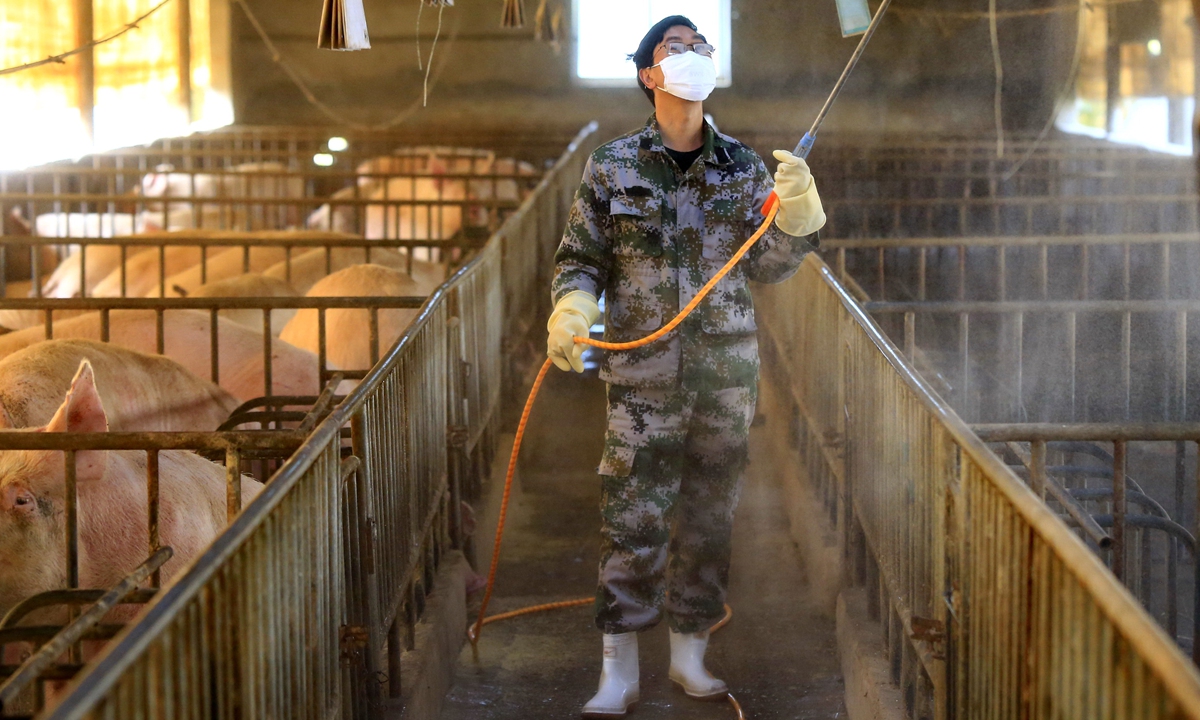
An employee is disinfecting the pigpen. Photo: cnsphoto
Illicit African swine fever (ASF) vaccines will be deal with in China due to their huge latent risks, the agriculture ministry said, while multiple vaccine candidates are undergoing clinical trials after around 1.2 million hogs were culled in China and pork prices soared by four times since 2018 due to the devastating virus.
"Fake ASF vaccines lack systematic tests, scientific assessment and review, so their safety and efficacy cannot be guaranteed. Using fake vaccines will not only bring risks to businesses, it will also affect the recovery of China's hog production and the industry's stable development," New Hope Liuhe, China's major hog producer, told the Global Times in a statement on Tuesday.
The company said it had not used, developed or researched such vaccines.
China's Ministry of Agriculture and Rural Affairs on Monday issued a notice, vowing to crack down on fake ASF vaccines. So far, none have been approved for the market across the globe.
"Vaccines that have not been approved for production or use with strict procedures are deemed fake. Their security risks are extremely high," the notice read, ordering local authorities to carry out comprehensive investigations and conduct epidemiological surveys.
The ministry also encouraged people to report fake vaccines and offered rewards of up to 30,000 yuan ($4,605).
Since 2019, illicit ASF vaccines have emerged in China and become popular with hog breeders. According to media reports in 2019, a dose of "ASF vaccine" was priced at 88 yuan on China's e-commerce platform Taobao.com, where an ad claimed that its efficacy can reach 90 percent. The store received more than 100 orders in one month, according to the seller.
Some of the illicit ASF vaccines were probably made based on published academic papers showing theoretical solutions to the virus by adopting gene deletion, Wang Zuli, deputy researcher at the Institute of Agricultural Economics and Development at the Chinese Academy of Agricultural Sciences, told the Global Times on Tuesday.
"Such vaccines may actually give the virus to healthy hogs and contaminate conveyances. Human mobility may also result in cross infection," Wang warned.
As of last October, eight laboratories in China were allowed to undertake ASF vaccine research and tests. Developed by the Harbin Veterinary Research Institute under the Chinese Academy of Agricultural Sciences, a type of ASF vaccine showed positive results in previous tests on 3,000 pigs and was ready for clinical trials, the agricultural ministry announced in August 2020. The research institute declined to answer the Global Times' inquiry about the vaccine's latest results.
When a Global Times reporter searched for ASF vaccines on Taobao.com on Tuesday, no such product was found. However, other types of products promising virus prevention were still being sold.
According to a customer service employee at the store of Henan dongfangjianbiotech, a type of feed additive, sold at the store can prevent ASF, with an efficacy rate of more than 85 percent.
"The virus still poses a threat to China's hog production, but it is controllable in the country, according to the stable conditions in the last year and a half," Wang noted, predicting China will be able to achieve hog production of pre-virus level soon.
As of the end of 2020, China's hog production had recovered to more than 92 percent of the pre-ASF level, officials said in February.
Thanks to the firm implementation of a hog-raising strategy, New Hope Liuhe sold 697,800 hogs in February, up 199 percent year-on-year.
"With the stock of hogs to be released, pork prices will drop for sure," Wang added. The official Consumer Price Index is to be released on Wednesday.
According to the Ministry of Commerce, pork prices in China fell from 47.47 yuan per kilogram in January to 38.59 yuan in February, diving 18.7 percent.

